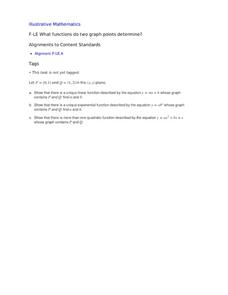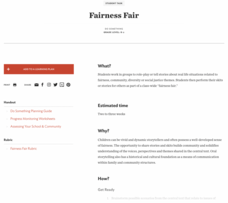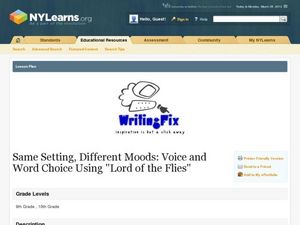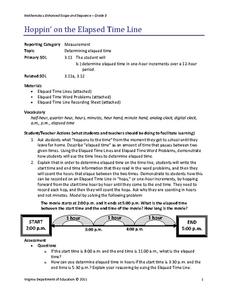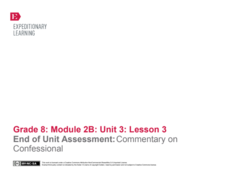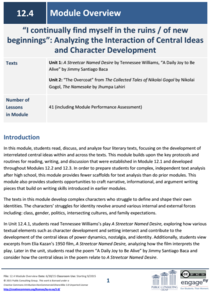Curated OER
How Much Are We Using?
Third graders investigate environmental stability through consumption and recycling. They look into how much of a recyclable good it takes to create one new product. Pupils compile a list of these quantities, then create posters that are...
Curated OER
Where Does Food Come From?
Distinguish between food and non-food items. Recognize that food is obtained from both plant and animal sources. Identify sources for some common animal foods then construct a simple food path from the farm to the consumer.
Curated OER
Investigate Science Using Crayfish
Young scientists discover the importance of scientific investigation by observing live crayfish. They carefully observe the patterns of crayfish in different environments. Then they discuss their conclusions and define what all living...
Virginia Department of Education
Modeling the Big Bang Theory
Young astronomers learn about the Big Bang Theory and redshift through a hands-on activity in the last installment of a three-part series. Participants draw dots on balloons and then inflate them to model how galaxies moved farther apart...
Curated OER
What Functions do Two Graph Points Determine?
Your algebra learners write linear, exponential, and quadratic equations containing the same two graph points in this collaborative task.
Teaching Tolerance
Fairness Fair
How can we create a more fair world? Chances are, class members have some ideas! After reading a text about fairness, individuals create skits around the ideas of fairness. Extend the learning and make their presentations a...
Curated OER
Same Setting, Different Moods: Voice and Word Choice Using Lord of the Flies
Whether it's dark, delightful, or somber, set the mood with William Golding's Lord of the Flies. High-schoolers practice descriptive writing by creating the appropriate mood for an original scene, starring one of the book's main...
Scholastic
Study Jams! Equivalent Fractions
Submarine sandwiches not only taste good, they also make for great math models. Follow along as Zoe explains how to calculate equivalent fractions, while cutting up a sandwich for herself and her friend. She demonstrates the process...
Virginia Department of Education
Hoppin' on the Elapsed Time Line
Time flies when you're teaching math! Okay, maybe not for everyone, but this lesson will have your young mathematicians calculating elapsed time before you know it.
GeorgiaStandards.org
Using Connecting Themes in First Grade Social Studies
Foster contributing members of society with a social studies unit focused on five aspects of community. First graders discuss themes of culture, groups, location, scarcity, and change with discussion questions and activities about...
University of North Carolina
Citation Builder
Does the publication date come before or after the title? Should there be a comma between the location and year? The answer depends on whether you're using the MLA, APA, Chicago,4or CSE/CBE style guide. A citation builder clears up...
Scholastic
Study Jams! Decimal & Fraction Equivalents
If a candy bar costs 3/4 of a dollar, can your mathematicians figure out the cost in cents? After watching this animated video, your learners will see that every fraction can be a decimal and every decimal can be a fraction. The video...
EngageNY
Looking Closely at Stanza 3—Identifying Rules to Live By Communicated in “If”
Just as Bud, from the novel Bud, Not Buddy by Christopher Paul Curtis, had rules to live by, so does the poem, If by Rudyard Kipling, but how do the two relate? Pupils delve deep into the poem's third stanza, participate in a grand...
Virginia Department of Education
Macromolecules
Finally, a chance for the class to play with their food! Allow pupils to simulate stomach acid with common foods, and introduce specific macromolecules into the mixture to explore characteristics of carbohydrates, lipids,...
Virginia Department of Education
Matching Representations
Pupils explore the many representations of linear functions by completing a matching activity to connect the multiple representations of a function. They then reinforce the connection as individuals create the different representations...
Virginia Department of Education
Pythagorean Theorem
Investigate the meaning of the Pythagorean Theorem through modeling. After comparing the area of the square of each side, individuals cut triangles and squares to facilitate the comparison.
EngageNY
End of Unit Assessment: Commentary on Confessional
What does commentary have to do with narrative? Before scholars explain the narrative choices in their Character Confessionals, they review provided commentary to explain the score they received on previous assessments. They review...
EngageNY
Grade 12 ELA Module 4: Literary Analysis
Does identity come from within, or do external forces shape it? Explore the complex identity concept with a two-unit module for 12th-grade language arts. The first unit uses A Streetcar Named Desire by Tennessee Williams and "A Daily Joy...
Mathed Up!
Forming and Solving Equations
What does geometry have to do with geometry? The portion of a review series for a math assessment highlights how equation formation is assessed on the test. Pupils use geometric concepts such as perimeter and the sum of the measures of...
College Board
2014 AP® Microeconomics Free-Response Questions
What effect do dynamics, monopolies, and the balance of skilled and unskilled labor have on a market place? How does supply affect the price of gasoline? Learners consider these questions and more using College Board materials as they...
College Board
2010 AP® Microeconomics Free-Response Questions
When the demand for ethanol goes up, what does that do to corn farmers, who provide a key ingredient? Learners ponder the connection using authentic College Board prompts in preparation for AP® or other exams. Other questions consider...
Radford University
Percentages: Lessons 2 and 3
What does salary have to do with it? Working in small groups, scholars use percentages to find simple interest and the value of a car they can afford on a given salary. Learners continue on to work with salaries and calculate amounts...
Scholastic
Study Jams! Order Fractions & Decimals
Going from fraction to decimal and decimal to fraction shouldn't be a chore, but an easy step for young mathematicians to do within problems. This interactive lesson shows how long division can change any fraction to a decimal. Started...
Blogger
Bell Work Template
Does your class do a quick activity to begin the period? Learners can try out a template for recording their work each day. Space is provided for the date, the pupil's name and period, writing from an activity each day, and a challenge.




